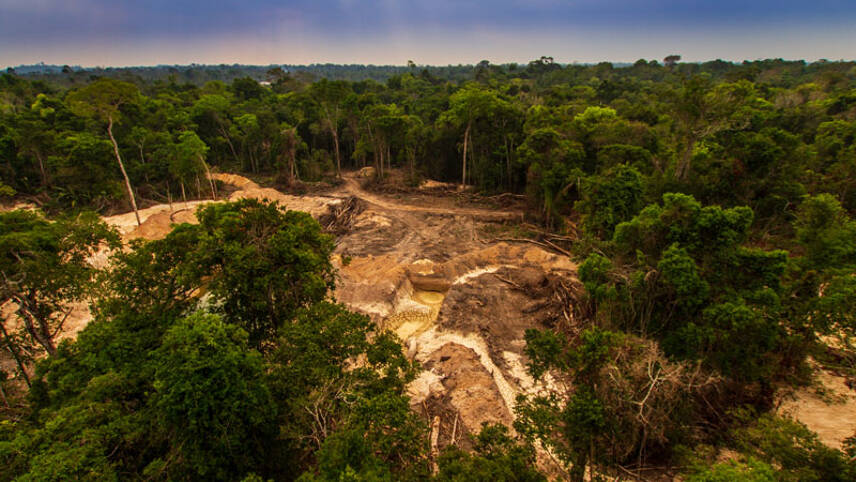Register for free and continue reading
Join our growing army of changemakers and get unlimited access to our premium content

New analysis released by WWF today (24 October) has confirmed that global forest loss was 4% higher in 2022 than in 2021, when the world leaders signed a declaration promising to halt and reverse deforestation by the end of the decade at the COP26 climate summit in Glasgow.
In 2022, the world missed its UN-backed deforestation target by 21%, WWF has revealed. Global forest loss during the year exceeded 6.6 million hectares, of which 4.1 million hectares – an area the size of Denmark – was tropical forest.
“Although forests are receiving more political attention than ever before, a lack of accountability makes tracking the impact of global pledges challenging,” WWF’s new Forests Pathway Report states.
Causes of forest loss identified in the report include agriculture, mining, urbanisation and infrastructure development. Agriculture is by far the biggest cause in tropical locations, resulting in the loss of 2.2 million hectares annually per WWF’s calculations.
Forest degradation drivers are also set out, with WWF warning that physical climate-related risks such as wildfires, air pollution and the increased risk of pests and diseases are increasing the fragmentation of forests in many key ecosystems.
The report outlines how addressing the causes of forest loss can be complex. Deforestation can be happening in agriculture and mining supply chains because local communities feel unable to make livelihoods for themselves, and these communities often opt for the cheapest but most destructive land clearance mechanisms. Moreover, weak legislation and monitoring can enable illegal activity to go unchecked.
Nonetheless, WWF believes that world leaders could make a series of top-line interventions to address forest loss and degradation at scale.
Chief among its recommendations is the removal or reform of all subsidies that harm forests. Under the UN’s biodiversity treaty ratified by more than 190 nations late last year, a commitment was made to phase out or reform subsidies that harm biodiversity by at least $500bn per year.
In tandem, nations should collectively mobilise at least $200bn of biodiversity-related funding per year, from a mix of private and public sources.
WWF chief executive Tanya Steele said: “Every hectare of forest we lose takes us closer to runaway climate change, and despite all the promises our leaders have made to turn this around, there’s a huge chasm between where we are and where we should be.
“Even worse, we’re continuing to finance deforestation through the products we buy and the activities governments and businesses support through the subsidies and investments they make. We need accelerated action in the UK and across the world from global leaders and businesses to transform the future for our forests and bring our world back to life.”
Policy blueprint
The report is intended to be used as a resource for the hundreds of world leaders and negotiators who will be attending the COP28 climate summit in Dubai this winter.
In addition to reforming their subsidies with nature in mind, world leaders are called upon to better recognise the rights of Indigenous People, who live in regions where 80% of the world’s biodiversity is found.
Nations should also, WWF argues, collaborate on a reform of global trade rules to limit the ability of commodities linked to deforestation to be traded internationally.
These reforms will need to be based on a new mindset in which the value of forests is greater when they are standing than when they are cut down.
Reforms should see bans on the trade of deforestation and conversion-linked products and goods. These bans would need to be coupled with “equitable protection” of the livelihoods of those currently reliant on illegal forest exploitation, enabled by an increased flow of forest finance from wealthy nations to lower-income nations with high forest cover.
“We do not need any more forest goals,” the report states. “What we need is to start implementing the ones we have justly, with ambition, and at pace, growing positive momentum in both the public and private sectors”.
The EU this year implemented a ban on seven forest-related commodities and products if they are found to be linked to deforestation. It covers palm oil, timber, soy, rubber, cattle, cocoa and coffee. Green groups say this is a good step forward, but smallholder farmers fear compliance may be challenging to prove. Moreover, it has stoked a row between the EU and palm oil nations including Indonesia, which has noted its recent claims of a decrease in deforestation rates.
The UK is not part of the ban due to Brexit. Under the Environment Act, the UK has promised a ban on forest product imports linked to illegal deforestation. WWF is imploring UK Prime Minister Rishi Sunak to enforce the due diligence system as soon as possible and to extend it to deforestation that is technically legal in other jurisdictions.
Additionally, the NGO wants the obligations to be extended to the financial services sector. An analysis of the world’s 150 biggest financial firms published earlier this year revealed that 61% have no commodit-specific deforestation policies.
Related articles: Pension providers accused of undermining net-zero commitments by bankrolling deforestation


Please login or Register to leave a comment.